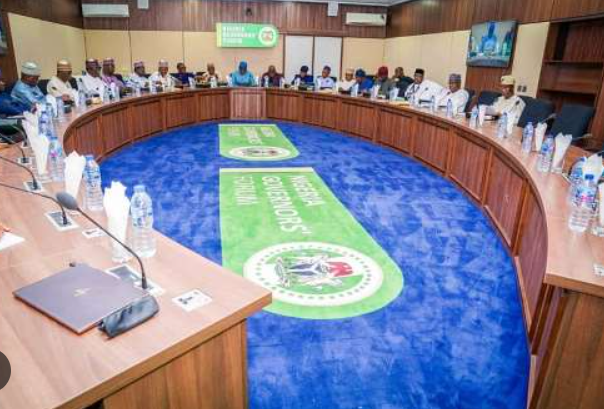By Joke Kujenya
THE PROPOSED national N60,000 minimum wage has been firmly opposed by the Nigerian Governors’ Forum (NGF) and members of the organized private sector, citing unsustainability concerns.
Hajiya Halimah Salihu Ahmed, Director of Media and Public Affairs for the NGF, disclosed the governors’ stance in an official statement released on Friday.
The governors warned that adopting the N60,000 minimum wage would lead to severe financial strain on many states, forcing them to allocate nearly all their Federal Account Allocation Committee (FAAC) funds to salaries, thereby neglecting vital development projects.
Additionally, NGF acknowledges the necessity of a new minimum wage and sympathizes with labor unions’ demands for higher pay, they however stress the importance of considering the broader implications of wage negotiations, which must account for consequential adjustments across all employment levels, including pensioners.
In more extreme cases, some states might need to borrow money every month just to meet payroll demands.
“The NGF agrees that a new minimum wage is necessary,” the statement reads. “We sympathize with the labour unions’ demand for higher wages. However, we must ensure that any new wage structure is sustainable and realistic, taking into account the consequential adjustments required across all employment cadres, including pensioners.”
The NGF also cautions that any agreement should not be rushed or signed for the sake of expediency, but it must be sustainable and realistic to ensure long-term viability.
The governors argue that the proposed N60,000 minimum wage is unsustainable, warning that it would force many states to allocate their entire Federal Account Allocation Committee (FAAC) funds to salaries, leaving no resources for developmental projects. In some cases, states might even need to borrow money each month just to pay workers.
The NGF adds that this situation would not be in the collective interest of the country, including the workers.
They appeal to all parties involved, especially labour unions, to consider all socioeconomic variables and strive for an agreement that is sustainable, durable, and equitable for all segments of society that have legitimate claims to public resources.
Organized labour, represented by the Nigeria Labour Congress (NLC) and the Trade Union Congress (TUC), recently launched an indefinite strike over the proposed minimum wage but temporarily relaxed it to allow for further negotiations.
However, the unions have maintained a firm stance against accepting anything less than the N60,000 figure.
Notably, members of the organized private sector, including the National Association of Small and Medium Enterprises (NASME), have also raised objections.
While expressing willingness to support a higher minimum wage, NASME representatives have called for tax exemptions or holidays if the wage exceeds N100,000, arguing that such high wages could jeopardize the viability of small and medium-sized enterprises.
Thursday, President Bola Tinubu was rumoured to have approved a new minimum wage of N105,000 following a briefing from Finance Minister Wale Edun.
However, the Presidency swiftly denied these claims, labeling the reports as false. Special Adviser to the President on Information and Strategy, Bayo Onanuga, clarified via his X social media handle that no such proposal had been made.
Still, negotiations continue as the tripartite committee, comprising representatives from the government, labour unions, and private sector employers, attempts to reach a consensus.
NLC President, Joe Ajaero, also confirmed that no final figure has been presented to the committee, and discussions remain ongoing.
Ajaero further expressed optimism that a resolution could be reached soon, with additional deliberations expected to provide clarity.
Minister of State for Labour Nkeiruka Onyejeocha, involved in the negotiations, assured that updates would be provided once talks are finalized.
He said the outcome of these discussions remains crucial for establishing a wage that balances the needs of workers with the financial realities of state governments and the private sector.





